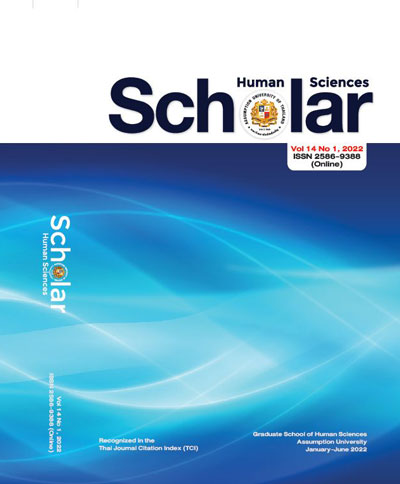A COMPARATIVE STUDY OF TECHNOLOGY-BASED MOTIVATION FOR LEARNING ENGLISH AS A FOREIGN LANGUAGE AMONG THAI LEARNERS AT WALL STREET ENGLISH BANGKOK ACCORDING TO THEIR GENDER AND ENGLISH LANGUAGE PROFICIENCY
Abstract
The purpose of this study was to determine the extent to which new technologies, such as the Internet or social media, served as sources of motivation for Thai English language learners to learn English as a foreign language (EFL) at Wall Street English (WSE) Bangkok. The study also sought to compare learners’ technology-based motivation for learning EFL, based on their gender and English language proficiency. For these purposes, the researchers adopted a quantitative comparative research design, using a questionnaire which was developed, piloted, validated and checked for internal consistency. The questionnaire was administered on 214 Thai English language learners from 11 centers of WSE in Bangkok. After the collected data were split by gender, an independent samples t-test was conducted to assess the significance of the results, while a one-way ANOVA test was used after the collected data were split by English language proficiency, in order to determine if there was a significant difference in technology-based motivation for learning EFL among the resulting groups. The research findings indicated that Thai learners were highly motivated to learn English in order to work with technology more effectively, regardless of their gender or English language proficiency. No significant difference in technology-based motivation for learning EFL between male and female Thai learners was derived from the data analysis. However, in relation to English language proficiency, it was found that the overall technology-based motivation for learning EFL was significantly higher in the beginner group than in the advanced group, as well as in the upper-intermediate group than in the advanced group.
References
Akobirov, F. R. (2004). The influence of technology on language learning and motivation with Uzbek EFL and United States ESL students (Unpublished master thesis). Bukhara State University, Bukhara, Uzbekistan.
Alsulami, S. (2016). The effects of technology on learning English as a foreign language among female EFL students at Effatt College: An exploratory study. Studies in Literature and Language, 12(4), 1-16.
Awwad, A. S., Stapa, S. H., &Maasum, T. N. R. T. M. (2019). Globalization and EFL learning motivation: A new perspective on integrative vs. instrumental motivation among Jordanian learners of English. International Journal of English and Education, 8(3), 165-183.
Block, D., & Cameron, D. (2002). Globalization and language teaching. New York: Routledge.
Crystal, D. (2003). English as a global language (2nd ed.). Cambridge, UK: Cambridge University Press.
Doms, D. (2003). Roles and impact of English as a global language(Unpublished master thesis). The University of Birmingham, Birmingham, United Kingdom.
Dörnyei, Z., Csizér, K., &Németh, N. (2006). Motivation, language attitudes, and globalization: A Hungarian perspective. Clevedon, UK: Multilingual Matters.
Gardner, R. C., & Lambert, W. E. (1972). Attitudes and motivation in second language learning. Rowley, Massachusetts: Newbury House.
Gardner, R. C., & Tremblay, P. F. (1994). On motivation, research agendas, and theoretical frameworks. Modern Language Journal, 78, 359-368.
Kachru, B. (1986). The alchemy of English: The spread, functions, and models of non-native Englishes. Oxford, UK: Pergamon.
Lukmani, Y. (1972). Motivation to learn and language proficiency. Language Learning, 22, 261-273.
Mehrpur, S., & Vojdani, M. (2012). Globalization and EFL learning motivation: A new perspective on integrative vs. instrumental motivation among Iranian learners of English. Journal of Modern Linguistics, 2(2), 43-50.
Shaaban, K.A., &Ghaith, G. M. (2000). Student motivation to learn English as a foreign language. Foreign Language Annals, 33, 632-644.
Wall Street English (2020). Ten reasons to study English at Wall Street English. https://www.wallstreetenglish.in.th/en/10-reasons-to-study-english-at-wall-street-english/
Warden, C., & Lin, H. J. (2000). Existence of integrative motivation in Asian EFL setting. Foreign Language Annals, 33, 535-547.
Wieking, B. A. (2016). Technology integration and student learning motivation (Unpublished master thesis). Northwestern College, Orange City, Iowa, USA.




